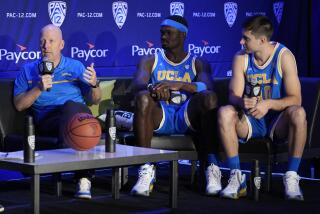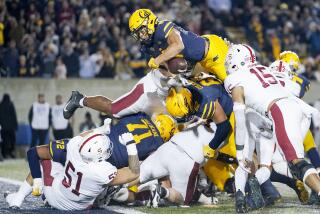Pacific Enterprises Chief Talks Turkey; Stock Gets the Ax
- Share via
Some Pacific Enterprises shareholders decided this week that the long-feared cut in the stock’s cash dividend is a done deal.
The company’s straight-shooting chief executive, James Ukropina, says that isn’t so. But he was candid enough to warn in the company’s 1990 annual report of the possibility of a cut, and that candidness has cost Pacific dearly.
The Los Angeles-based company, parent of Southern California Gas, Thrifty drugstores and a mix of other businesses, has seen its stock plunge to $34.875 at Thursday’s close from $41.75 Tuesday. That erased 16%--$481 million--of Pacific’s market value.
The stock fell $3.25 on Wednesday after a negative Wall Street Journal story, and another $3.625 on Thursday as investors focused on a paragraph in Pacific’s just-released annual report. The passage, on Page 34 of the report, says simply that Pacific “may choose to reduce capital spending, sell assets, or reconsider its dividend policy, or a combination thereof,” if the economy and the firm’s financing needs merit in 1991.
By his own account, Ukropina admits that he wanted to prepare shareholders for a worst-case scenario this year. “I happen to believe we could be in for a longer and deeper recession than other people believe,” he says.
Now, with the stock already anticipating a lowered dividend, some investors may assume that the company will quickly oblige--figuring there’s nothing more to lose.
But Ukropina says Pacific “will not be taking into account what (Wall) Street thinks we will do” in setting the dividend, because “that’s often not rational.” For now, the $3.48-a-share annual dividend remains, he says.
Likewise, he says shareholders shouldn’t be unduly concerned that Pacific could try to raise cash by issuing new stock this year, even though that possibility, too, is raised in the annual report. Ukropina looks like a cautious man just trying to cover all the bases, given the economy. Of the possibility of selling new stock (which would dilute existing shareholders’ interest), he says, “There’s a relatively good probability that we will not need new issuance” beyond funding the company’s employee stock ownership plan.
Pacific, which had revenue of $6.9 billion last year, hasn’t earned enough to cover its dividend since 1988. Earnings were $3.51 a share that year, $3.05 in 1989 and $3.07 last year (the latter before one-time charges).
In the short run, net earnings don’t have to cover the dividend, because what really counts is internal cash flow. And Pacific has strong cash flow thanks largely to the company’s core business--the gas company--and to its ability to borrow or reconfigure debt to make up for whatever earnings don’t provide.
Eventually, though, most companies decide to pay a dividend within the confines of real earnings. So many analysts have been counting down to a dividend cut at Pacific since 1988.
Pacific’s earnings slump stems from its big diversification push of the 1980s. To counter slowing growth within the gas company, Pacific bought the Thrifty drugstore chain in 1986 and the Sabine Corp. oil and gas exploration company in 1988. In both cases, Pacific paid ridiculously high prices, most analysts say.
Worse, both acquisitions have proved more troublesome than Pacific could ever have imagined. Thrifty, with 1,058 drug and sporting goods stores in 19 states, has suffered from tough competition, high merchandise theft and shrinking pharmacy margins.
The oil and gas unit, meanwhile, has eaten up huge cash sums hunting for new reserves, mostly without success. Prudential Securities analyst David Fleischer, who has recently been telling clients that Pacific’s dividend is safe, nonetheless admits that “we have heard nothing that has convinced us” that the oil and gas exploration unit has found a winning formula to replenish reserves.
So the company--and its shareholders--are playing a waiting game, hoping that new management at both Thrifty and the oil and gas unit can turn things around. (CEO Ukropina named new teams to run each last year.) Yet analyst Paul Milbauer at C. J. Lawrence Inc. in New York says the market has been living with this waiting game, and the chance of a dividend cut, for a long time. Why the stock should react as it did this week is inexplicable, Milbauer says. “Whoever owned the stock and now is selling it has been asleep at the switch,” he says.
Milbauer believes that Pacific will earn just $2.75 a share this year. He also believes that the dividend will indeed be cut, to about $2 a share. That would approximate the 70% payout ratio of other natural gas distributors, he says. A $2-a-share dividend at the current stock price of $34.875 would mean an annualized yield of 5.7%, which is in the range of the yields on other diversified gas stocks. Thus, Milbauer doesn’t believe the stock will go drastically lower.
Of course, Pacific doesn’t have to cut its dividend, even if earnings come up short again. It could trim capital spending (which totaled $640 million last year) and/or sell assets to conserve cash. Wall Street obviously is discounting that either of those moves would be enough. But then, Wall Street looks pretty silly to have completely discounted a dividend cut until Wednesday.
In the stock market, the most optimistic expectations rarely come true, and neither do the most pessimistic. The pendulum may have swung too far to the negative side in Pacific’s case.
More to Read
Inside the business of entertainment
The Wide Shot brings you news, analysis and insights on everything from streaming wars to production — and what it all means for the future.
You may occasionally receive promotional content from the Los Angeles Times.










